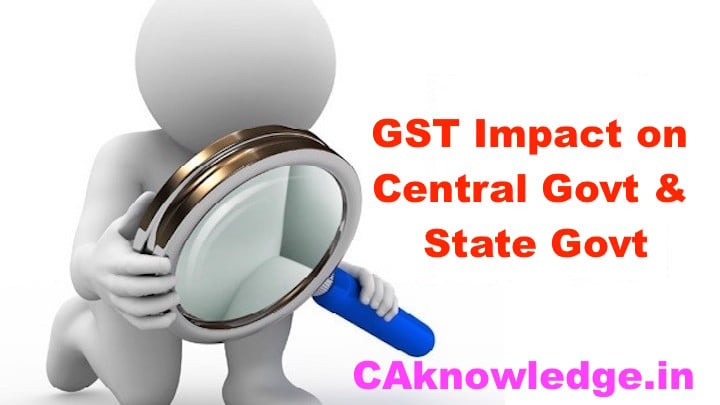GST Impact on Central Government & State Government – An Analysis. GST Bill is passed in Lock Sabha and Rajya Sabha and it is expected to be roll out from 1st July. We already provided GST Registration Procedure and now Everyone want to know about Impact of GST on there business so in this series today we provide complete analysis for GST Impact on Central Govt and GST Impact of State Govt. Check complete details form below….
GST Impact on Central Government & State Government
GST Impact on Central Government
- (a) Increased collection of CGST and IGST: The collection of taxes-CGST and IGST would increase when more and more assesses register and pay taxes due to simplified tax laws under GST regime.
- (b) Loss of CST revenues: The CST which was 2 % accruing to the State of collection has been subsumed into GST. This revenue would not be available to the States.
- (c) Refunds under GST: The refunds under Central excise and service tax laws take long time. However, in GST Regime, refunds are expected to be processed faster with 90% of the total refund amount being available on submission of proper documents
- (d) Reduced corruption: When the laws are simplified, then the chances of multiple interpretations would get reduced, leading to reduction in disputes and consequent litigation. Also, the automation of the payments/returns filing and other compliances could mean that the interaction between the assessee and the department officers would come down to minimum. This would reduce corruption and increase ethics gradually.
- (e) Compensation for loss of revenues to States: The compensation of loss of tax revenues to the States on account of implementation of GST would be an outgo. In reality there may be minimal outgo except for the weaker States. All expected to gain due to increased compliance.
GST Impact on State Government
- (a) Proliferation of computerization leading to fall in transaction costs: Due to increase in computerization due to GSTN, the tax administration would be easier and cost of collection would be less.
- (b) The Destination Principle: States which are net consumers would benefit due to the accrual on destination. The producing States may have a comparative disadvantage.
Other
- (i) A unified common national market to boost Foreign Investment and “Make in India” campaign
- (ii) Boost to export/manufacturing activity, generation of more employment, leading to reduced poverty and increased GDP growth
- (iii) Improving the overall investment climate in the country which will benefit the development of states (
- iv) Uniform SGST and IGST rates to reduce the incentive for tax evasion
- (v) Reduction in compliance costs as no requirement of multiple record keeping
Recommended Articles
- Why GST For India?
- Introduction of GST
- GST Objective
- GST Current Tax Structure and proposed GST
- Filing of GST Returns
- GST Forms
- GST Rate
- GST Registration
- HSN Code List
- GST Login
- GST Rules
- GST Impact on Textiles industry
If you have any query or suggestion regarding “GST Impact on Central Government & State Government ” then please tell us via below comment box….

gst impact on general public
gst impact on general public